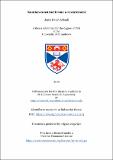Files in this item
Kantian constructivism: a restatement
Item metadata
| dc.contributor.advisor | Timmermann, Jens | |
| dc.contributor.author | Schaab, Janis David | |
| dc.coverage.spatial | x, 191 p. | en_US |
| dc.date.accessioned | 2019-03-26T12:42:28Z | |
| dc.date.available | 2019-03-26T12:42:28Z | |
| dc.date.issued | 2019-06-24 | |
| dc.identifier.uri | https://hdl.handle.net/10023/17374 | |
| dc.description.abstract | This thesis provides a restatement of Kantian constructivism, with the aim of avoiding some of the objections and clearing up some of the ambiguities that have haunted previous versions of the view. I restate Kantian constructivism as the view that morality’s normativity has its source in the form of second-personal reasoning, a mode of practical reasoning in which we engage when we address demands person-to-person. By advancing a position about the source of moral normativity, Kantian constructivism addresses a metaethical question, albeit one that is distinct from the questions that many traditional metaethical positions, such as moral realism, focus on. Kantian constructivism has an advantage over competing views of the source of moral normativity when it comes to answering the so-called Normative Question, which I interpret as the question of why we are rationally required to do what we take to be our moral obligation. Kantian constructivism can answer this question because, unlike its competitors, it does not conceive of practical reason as a receptive faculty that is determined by external inputs. Instead, it regards the very form of second-personal reasoning as grounding the fact that morality is normative, thus explaining morality’s rational authority. Although second-personal reasoning is fundamentally distinct from the merely first-personal mode of reasoning that we must engage in insofar as we are agents, all those agents whom we would ordinarily consider bound by moral obligations seem to engage in it. Indeed, although it involves irreducibly second-personal notions, such as accountability and the authority to address legitimate demands, second-personal reasoning is not to be mistaken for a social practice. Instead, it can be applied to purely self-regarding contexts, such as that of committing oneself to a personal project and thereby holding oneself accountable for pursuing it, as well as to interactions with others. | en_US |
| dc.language.iso | en | en_US |
| dc.publisher | University of St Andrews | |
| dc.rights | Attribution-NonCommercial-NoDerivatives 4.0 International | * |
| dc.rights.uri | http://creativecommons.org/licenses/by-nc-nd/4.0/ | * |
| dc.subject | Ethics | en_US |
| dc.subject | Kant | en_US |
| dc.subject | Philosophy | en_US |
| dc.subject | Metaethics | en_US |
| dc.subject | Practical reason | en_US |
| dc.subject.lcc | BJ1458.3S2 | |
| dc.subject.lcsh | Normativity (Ethics) | en |
| dc.subject.lcsh | Kant, Immanuel, 1724-1804--Contributions in ethics | en |
| dc.subject.lcsh | Metaethics | en |
| dc.subject.lcsh | Practical reason | en |
| dc.title | Kantian constructivism: a restatement | en_US |
| dc.type | Thesis | en_US |
| dc.contributor.sponsor | Aristotelian Society (Great Britain) | en_US |
| dc.contributor.sponsor | University of St. Andrews. Centre for Ethics, Philosophy and Public Affairs | en_US |
| dc.contributor.sponsor | Erasmus+ (Program) | en_US |
| dc.contributor.sponsor | University of St Andrews. Department of Philosophy | en_US |
| dc.contributor.sponsor | Russell Trust | en_US |
| dc.contributor.sponsor | Santander UK. Santander Universities | en_US |
| dc.type.qualificationlevel | Doctoral | en_US |
| dc.type.qualificationname | PhD Doctor of Philosophy | en_US |
| dc.publisher.institution | The University of St Andrews | en_US |
| dc.publisher.department | University of Stirling | en_US |
| dc.rights.embargoreason | Embargo period has ended, thesis made available in accordance with University regulations | en |
| dc.identifier.doi | https://doi.org/10.17630/10023-17374 |
The following licence files are associated with this item:
This item appears in the following Collection(s)
Except where otherwise noted within the work, this item's licence for re-use is described as Attribution-NonCommercial-NoDerivatives 4.0 International
Items in the St Andrews Research Repository are protected by copyright, with all rights reserved, unless otherwise indicated.


